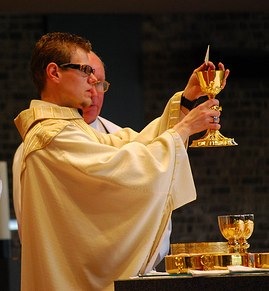 A real estate agent once told me, “When you’re selling a house, you lead with your strongest asset. You talk about the best features first.”
A real estate agent once told me, “When you’re selling a house, you lead with your strongest asset. You talk about the best features first.”
She told me this during a lecture on evangelization in the RCIA.
“So,” she asked, “why do we always wait so late in the game to start talking about the Eucharist? It’s the best thing we’ve got!”
The Eucharist is the most spiritually beneficial thing in the Catholic Church. But it’s usually not the first thing people talk about when trying to evangelize.
There’s the feeling that it’s too complex and loaded a topic to tackle right away.
So how do you introduce the Eucharist to non-Catholics so that it draws them in deeper instead of scaring them away? That’s what this post is about.
Start off emphasizing benefits
The key is respecting the stages of spiritual development.
Evangelizing catechists know where their students are and how much they can take.
In the beginning, you can’t start off talking about theological elements of the Eucharist. You’ll lose your audience.
You start off talking about the benefits–why it’s important and what it can do for them.
At the start, the why of the Eucharist is more important than the what.
The Eucharist increases your union with Christ
The main benefit of the Eucharist is it unites you more closely to Christ.
Doesn’t sound important? Well actually…it’s everything!
In the beginning, Adam and Eve were in union with God. Their union came through the supernatural life of God residing in their souls.
This divine life of God was the ordering principle of their souls. It gave them an internal harmony. Their wills were perfectly aligned with God’s will.
Their passions perfectly obeyed reason. They didn’t have fly off the handle in anger. They didn’t eat too many sweets. They weren’t envious, greedy, or lustful. Harmony!
This internal harmony of Adam and Eve led to a harmony with each other and with nature.
All that changed with the original sin. They turned their backs on relationship with God, lost the divine life of God within them, and broke their intimate union with him.
Union with God and his divine presence in your soul is everything in the spiritual life. You get that presence back with Baptism but it’s increased every time you receive the Eucharist.
This is the ordering principle of the soul. It’s what helps you follow God’s will.
The Eucharist separates you from sin
Another great benefit is the Eucharist helps you stay away from sin.
Think about it. Sin is making choices that seem good to you but that are outside what God wants for you.
You make these choices because your soul is disordered. It comes from original sin.
Your soul needs to get re-ordered. God’s divine life increased through the Eucharist is the way to do it.
Increased order in your soul will help you make better choices. It helps you avoid sin.
The Eucharist wipes away venial sin, preserves from mortal sin
The increase of God’s presence in your souls wipes away your lesser sins.
These sins can’t continue their hold on you at the same time God’s love is flooding your soul.
For the same reason, it also helps you break your attachment to the mortal sins.
Your soul become more and more ordered to God, less and less attracted to the things that take you away from union with God.
The Eucharist makes the Church
Finally, the Eucharist unites you more closely to everyone else in the Church.
Remember the harmonies? The ordering principle of God’s life created an interpersonal harmony between Adam and Eve.
The same thing happens with us when we receive the Eucharist.
There’s another way of looking at this too. In the Eucharist, we are united more closely to Christ, and Christ unites unites the Church. The Church is his Mystical Body.
So, in that sense, the Eucharist makes the Church because it binds all believers more closely together.
Evangelization Takeaway
Don’t be afraid to lead with your strongest assets.
The Eucharist is one of the greatest spiritual benefits in the Catholic Church–no, in the world! Proclaiming it confidently is effective evangelization.
It can be difficult to understand but given the proper context and the right set up, you’ll draw them deeper into the intricate beauty and comprehensive unity of the Catholic Faith.

What I tell non-Cats:
A big deal about Jesus was that we humans, comprising a body’n’soul, were for the first time able to encounter God fully: not just spiritually, but physically.
Before Jesus ascended, he said “..lo, I am with you always, to the close of the age.” (Mt 28:20)
The Eucharist is the miracle that allows us to still encounter God through both of our natures; that is, it’s how Jesus stays with us always- not just in spiritually (after all, God the Father & Holy Spirit could do that), but physically.
I like that Christian. I think you’re right. The big deal is that in Jesus we first encountered God physically. And, the Eucharist allows us to still do that.
Great post Marc!!!!
Thanks William!
One way to introduce it early is to incorporate it in a witness talk which we do as part of introductions by the team leaders … Speak about the meaning of the Eucharist to you on a personal level.
That is a really great idea! I do a lot of personal witness talks in the beginning of the RCIA classes but I hadn’t thought about specifically adding stuff about the Eucharist and how team members are affected by it. Thanks for sharing this!